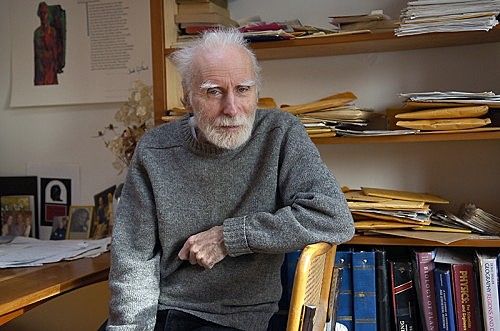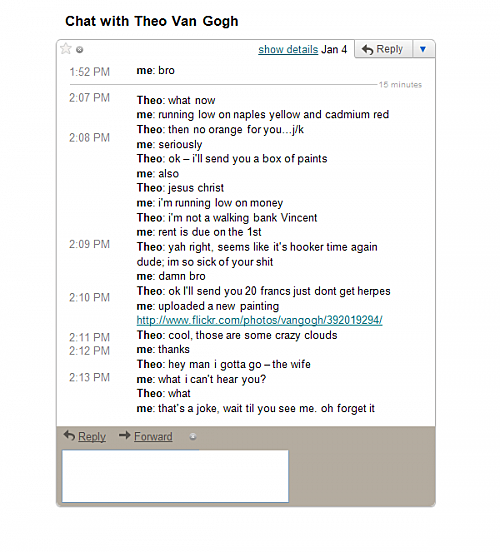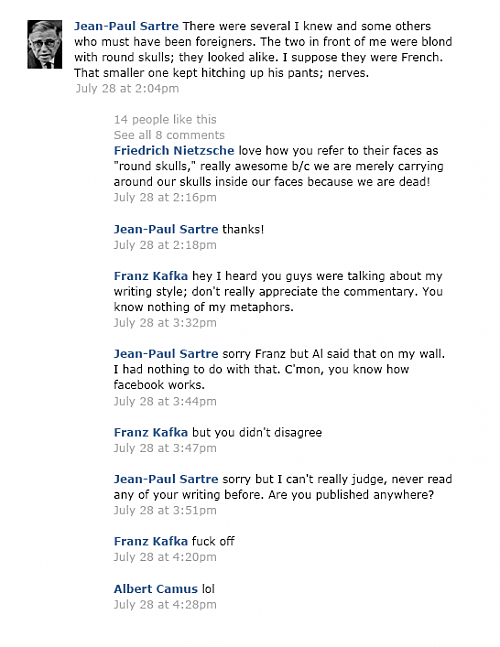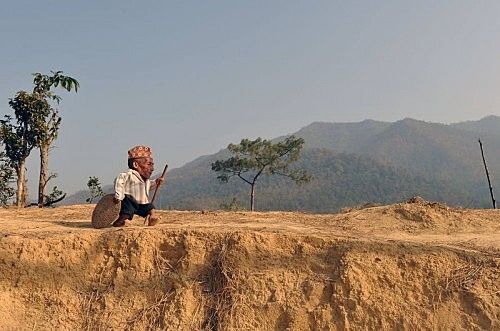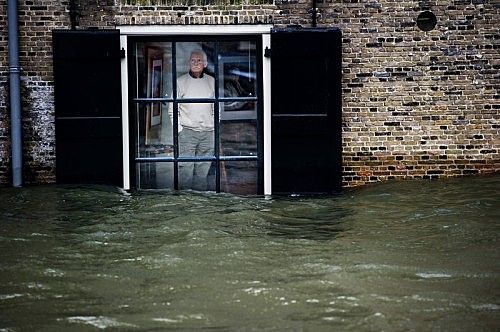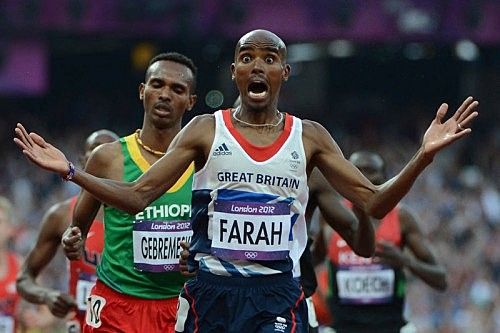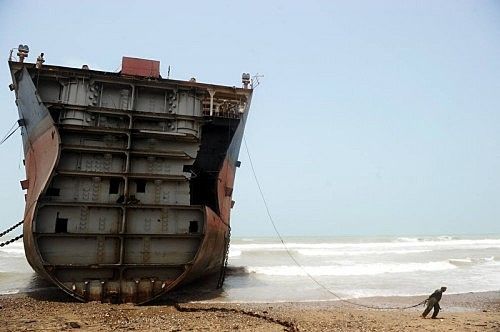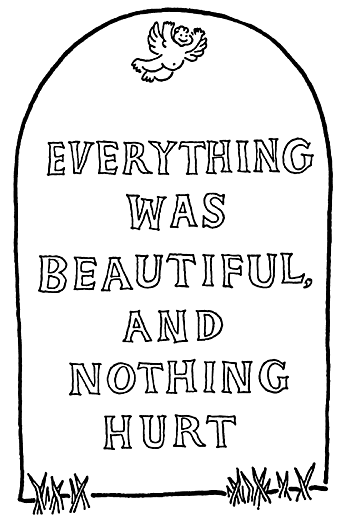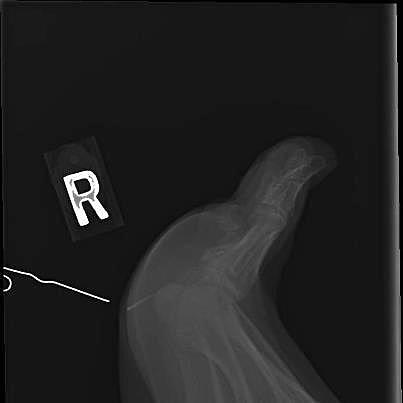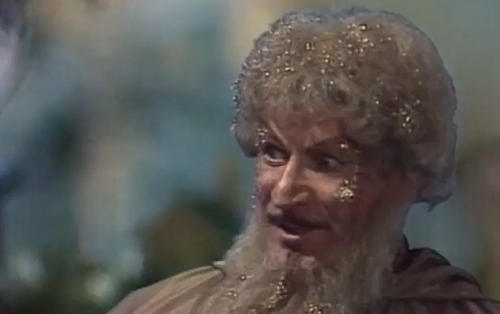Internet Histories | 10 December
This fortnight - when secrecy begets good journalistic hustle, Sartre's 'The (Facebook) Wall, an assignment from Kurt Vonnegut, the Little Printer, and the most extraordinary scatological Christmas rite.
This Fortnight (and the last for 2012):
When closed doors foster good journalism | The last word on The Smiths?
Christmas, Catalan style | Literary masturbation | AFP's Best Images for 2012
Sartre's The Wall on his Facebook wall | The immortal jellyfish | Praying for Kate
An assignment from Vonnegut | Surgery and the curing of death
Criticising The Hobbit | Stripping convicts of citizenship (?!?)
and
a super warm hello and welcome to Uther Dean
Uther
Boiling the whole of my internet history for 2012 down to a handful of links was unexpectedly hard. Not because of the size of it or even the wide spread of it, but because of how it resists narrativisation or any sense of connection. 2012 was the year I devolved from being a link follower clicking through and through and through and feel into the arms of various link aggregators (including, to my shame, Reddit which is interesting only really in how that it manages to be the best case-in-point for how it is anonymity that is fucking the internet).
For every twenty bits of net hideousness, of misogyny or racism or classism or whateverism that they web catching holes spits out there will be one or two nuggets of joy. It may be hideous having to tune through all the ugly white noise but it almost becomes worthwhile when you stumble across something as enlightening as David Simon's original series bible for The Wire (.pdf) every once in a while (Stringy Bell doesn't quite have the same ring to it, does it?).
I have, I realised, fallen into one of the greatest traps of the internet, I now treat it like television. I will find a web comic that I like and then tear through it like it's a box-set. When it's a complete story like Warren Ellis and Paul Duffield's occasionally sublime, drunken squint into post-apocalyptic steam punk FreakAngels, it can be rewarding but if the internet is good at one thing it is not finishing things so more often than not archive binges end much more unsatisfactorally than they start.
I treat it like television also in that I have my appointments. An intricate schedule of podcasts regularly ping into my Google Reader insuring I am never without white middle class musing on all the most vapid of things. Though it does have to be said that this year was an especially good one for podcasts with both Radiolab finally finding its balance between quirkiness, content and actual accessability, and The Sound of Young America's relaunch as Bullseye has managed to finally let it bloom into the joyous, unironic celebration of mainstream culture that it always wanted so badly to be.
It's basically passe at this point to recommend This American Life to anyone, but it is hard to consider my internet history for 2012 without thinking about their Retraction. A hour long retraction of episode from earlier in the year about a man called Mike Daisey's trip to Foxconn. It manages to be both an delightfully deep discussion of what truth in media is (without resorting to boring old hand epistimology) and an oddly human story of a man who it seems really can't see what he did wrong. It climaxes with an extended interview stroke confrontation between the host, Ira Glass, and Daisey that manages to perfectly cross the streams of those two strands in an eerily touching way. The pause after Glass admits that he's hurt because “I put my name on the line for you” is probably the finest piece of drama this year.
My most secret shame, when it comes to my internet history, is my addiction to Youtube. And it's not just random surfing cats and k-pop Youtube that I'm addicted to. I'm addicted to the bloggers. The personalities. There is something oddly comforting that there is whole ocean of the lonely out there, talking into their cameras all, to greater or lesser degrees, of success pleading or attention and validation. The comforting thing is that some of them seem to find it. I don't know why I find a little joy in 20-year-old British kids speaking to millions of people, but I do. The only video I'd willingly share with others is this where weblebrity Charlie McDonnell experiences and expresses the ultimate conclusion of that search for validation; fear.
Joe
The Trans-Pacific Partnership Agreement (TPPA) hit Auckland for its umpteenth round of negotiations this week just past. In facetious shorthand, it’s basically the free trade agreement between the United States and NZ that was parlayed into a Holy Grail sure-fire economic miracle for decades before talks even began. When we entered into it with a handful of other countries in 2008, there was an unshakeable bipartisan belief in its untold billions of dollars of value. Flash-forward to 2012, and we finally seem to be cultivating some healthy scepticism about that, and the serious trade-offs we’d be expected to make.
I need to declare my conflict of interest straight off the bat - I help with the day-to-day running of It’s Our Future, a broad-base civil society campaign that aims for the TPPA talks to be held with full and fair public consultation (they’re not) and for NZ’s sovereign right to legislate for the good of public health, the environment, and the economy to stay off the bargaining table (it’s on). Even so, simply viewing this as someone who’s interested in journalism is really interesting and affirming. The lack of substantive or valuable information on the text itself (apart from a couple of leaked chapters) is gradually leading to more substantive and dedicated writing, rather than a media blackout. Writers are conducting interviews with industry and experts, looking at past experience, doing their research. It’s a fascinating paradox, and one that suggests that the lack of transparency involved in the talks may ultimately be harming any buy-in and progress in the deal.
Without further ado, here are some of the best pieces of writing on issues around the TPPA in the last week, and a useful way to inform yourself: Geoff Cumming in the NZ Heraldabout the intellectual property demands US negotiators and stakeholders are making and what they could entail for our digital lives; Rod Oram for the Sunday Star-Times on December 9breaking down some of the economic opportunities of the talks and finding only smoke and mirrors (not online, but I’ll link when it is); Briar Mannering of the NZ Medical Students’ Association on what the agreement means for PHARMAC and smokefree policy; and the always-fantastic Gordon Campbell, whose Werewolf magazine is effectively dedicated to the agreement this month, but has probably produced the #1 primer on the thing with this article.
And if that leaves you feeling enlightened, here’s Fran O’Sullivan essentially demanding that the University Of Auckland produce academics who will say pro-TPPA things she can use in her editorial, while simultaneously dressing down Professor Jane Kelsey for engaging with civil society in her role as a teacher and researcher. Go Fran go!
(PS: Don’t like the stuff you read about in these? This is a rare issue where you might be able to teach your local MP a thing or two by writing to them or contacting them about it. My suspicion is that there’s still a lot of them out there who don’t fully appreciate the scope of negotiations, or what their ramifications are).
Hey, so Morrissey is coming to town on Saturday (or, rumour has it, is in town already). I’ll probably decide in the next couple of days whether I bother to go see the miserable old git – for now, Salonhas an interview with UK music writer Tony Fletcher, whose book A Light That Never Goes Out: The Enduring Saga Of The Smithsdropped last week. At 700 pages, Fletcher’s tome will hopefully be the last word on this band for some time – between Johnny Rogan’s infamous and unauthorised ‘behind the music ‘ 90s tell-all, Simon Goddard’s painstaking song-by-song trawling from 2002, and the God’s own work done by the curators of foreverill.com in the Internet’s early days, I think they’ve got it all now. Fletcher’s real last-dance coup appears to be getting time with all four band members, some of which is hinted at in this interview’s conclusion and may really be the only thing that truly justifies this purchase.
So let’s not pretend this is anything more than two die-hard fans (one of whom is Salon’s executive editor!) celebrating the songs that saved their lives, but that’s still fine, and it’s certainly recommended reading if you’ve only been passively interested in the band and want an overview of what makes them resonate. For my part, returning to the Smiths after a few months away is its typical revelation, one of the only times I go from just really enjoying music I like to slack-jawed, inarticulate astonishment. Their best moments feel almost sui generis in a way that nothing I’ve encountered in pop music since does - lost in ‘Well I Wonder’ for the sixth straight play last night, any tendency to trainspot for DNA or influences or lineage or talk about scenes or movements, or remember that all things pass and people go on to unsatisfactory solo careers fails me – I just know that four boys from Manchester sat down in a recording studio one day in 1985 and somehow, impossibly, accomplished this.
Fletcher also gets my assent by giving the right answer to the question of whether the Smiths should re-unite. That’s an emphatic no. In terms of the pop groups who could still conceivably attempt this (ie: no one’s dead) and haven’t, it’s really just them and ABBA (who you don’t have to like, but you certainly can’t mitigate the influence of). If you apply a very hard and fast rule that generating more cultural output, either live or recorded, isn’t worth it unless all that cultural output is equal to or superior to the original work, unless it doesn’t dilute what came before at all or detract in any way from that original transaction, then literally everyone has fucked it with a cycle of diminishing returns. What we have with Morrissey and Marr et al is a very satisfying closed book. No sequels, but lots of well-thumbed chapters.
From the annals of the Internet Archive, where the Future is always Now – a Radio Shack catalogue from 1983, featuring $2000 printers and the most enthusiastic and involved descriptions of primitive computer games that side of the milennium. Try to lose the little “buggers” hot on your trail!
Lastly, what would our final IH for the year be without acknowledging Christmas? Specifically, the amazing Catalonian holiday concept of El Caganer (‘The Defecator’). From a pleasingly comprehensive and sympathetic Wikipedia page:
A Caganer (Catalan pronunciation: [kəɣəˈne], Western Catalan: [kaɣaˈne]) is a figurine depicted in the act of defecation appearing in nativity scenes in Catalonia and neighbouring areas with Catalan culture such as Andorra, Valencia, Northern Catalonia (in southern France) and the Balearic Islands. It is most popular and widespread in these areas, but can also be found in other areas of Spain (Murcia), Portugal and southern Italy (Naples)…. accompanying Mary, Joseph, Jesus, the shepherds and company, the caganer is often tucked away in a corner of the model, typically nowhere near the manger scene. A tradition in the Catalan Countries is to have children find the hidden figure.
Possible reasons for placing a figure representing a person in the act of excreting waste in a scene which is widely considered holy include:
- Tradition.
- Perceived humour.
- A fun spectacle, especially for children.
- The Caganer represents the equality of all people: regardless of status, race, or gender, everyone defecates.
- Increased naturalism of an otherwise archetypal (thus idealised) story, so that it is more believable, more real and can be taken more seriously.
Below is the world’s largest caganer, installed at Christmas at the Maremagnum Shopping Mall in Barcelona:
Better still is the Christmas Catalan tradition of Tió de Nadal, or Caga Tió (“shitting log”), involving the demolition of a pinata-like length of hollow wood and this nursery rhyme:
Happy holidays, everyone!
Rosabel
My ongoing obsession with Gordon Lish continues tangentially in the form of this fantastic conversation he had with Jack Gilbert in 1962. On the many iterations of poetry and his despair with a certain brand of experimentalism, Gilbert says:
Poetry is a word like love: an endless confusion of different things all warped into one word because no vocabulary of discrimination exists. So I’m not saying my way of writing poetry is the way. But I am admitting my weariness with the great body of poetry which is nothing more than a curious manipulation of words, what Kenneth Tynan has called literary masturbation—a sterile effort to force words to breed. After one or two pages of surrealistic poetry my mind just stubbornly refuses to be polite. Wallace Stevens put it very well when he said that the trouble with surrealism is that it invents rather than discovers. It’s a kind of trick anybody can learn who has imagination. You just throw your mind slightly out of focus so everything seems different. Or better yet, you learn to set your mind wrong so that each item is mechanically related to an inappropriate neighbor.
Which leads me to this wonderful poem of his:
The Forgotten Dialect of the Heart
How astonishing it is that language can almost mean,
and frightening that it does not quite. Love, we say,
God, we say, Rome and Michiko, we write, and the words
Get it wrong. We say bread and it means according
to which nation. French has no word for home,
and we have no word for strict pleasure. A people
in northern India is dying out because their ancient
tongue has no words for endearment. I dream of lost
vocabularies that might express some of what
we no longer can. Maybe the Etruscan texts would
finally explain why the couples on their tombs
are smiling. And maybe not. When the thousands
of mysterious Sumerian tablets were translated,
they seemed to be business records. But what if they
are poems or psalms? My joy is the same as twelve
Ethiopian goats standing silent in the morning light.
O Lord, thou art slabs of salt and ingots of copper,
as grand as ripe barley lithe under the wind's labor.
Her breasts are six white oxen loaded with bolts
of long-fibered Egyptian cotton. My love is a hundred
pitchers of honey. Shiploads of thuya are what
my body wants to say to your body. Giraffes are this
desire in the dark. Perhaps the spiral Minoan script
is not a language but a map. What we feel most has
no name but amber, archers, cinnamon, horses and birds.
From THE GREAT FIRES: POEMS, 1982-1992
On the topic of Lish, Jimmy Chen's Raymond Carver's OkCupid Profile is brilliant, as is the rest of his terrific series of literary figures using social media:
From Lost Gchats:
From Sartre publishes “The Wall” on his facebook wall (Camus's final 'lol' always gets me):
Finally, Agence France-Presse recently released their best photos of 2012. Some highlights - besides those iconic images of Obama and his wife, and Clint Eastwood and his chair - include:
Chandra Bahadur Dangi, a 72-year-old Nepalese weaver, the shortest man in the world at 54.6 cm.
A fire ball rises as the Israeli air force carries out a raid over Gaza City on November 17, 2012, for the fourth consecutive day.
New taxi cabs are seen in a lot as flood waters recede on October 31, 2012 in Hoboken, New Jersey. Hurricane Sandy which made landfall along the New Jersey shore, has left parts of the state and the surrounding area flooded and without power.
A Dutch local resident, standing in his house, looks to high waters level through his window, in Dordrecht on January 5, 2012.
France's opposition Socialist Party (PS) candidate for the 2012 French presidential election Francois Hollande (C) receives flour, thrown by a woman (R) while he was signing a pact on French housing crisis with representatives of the Abb Pierre Foundation on February 1, 2012 in Paris.
Britain's Mohamed Farah celebrates after winning the men's 5000m final at the athletics event of the London 2012 Olympic Games on August 11, 2012 in London.
A leopard (Panthera pardus) attacks and wounds Pintu Dey, an Indian labourer in a residential neighbourhood of Silphukhuri area in Guwahati on January 7, 2012. Three people were seriously injured in the leopard attack before the feline was tranquilized and taken to Assam state zoo. Pintu Dey, in his 40s, is recovering in a hospital in India's northeastern state of Assam after being badly mauled outside his house in the attack.
This one amazes me especially because it places the ethics of photojournalism in the forefront. It's alarming that in a situation like this - where the benefits of the photo fail to outweigh those of somehow intervening - somebody's first instinct was to pull out a camera.
In this photograph taken on July 10, 2012, a Pakistani worker pulls on a wire he will connect to a thick chain that will in turn be used to peel away a slab of the outer structure of a beached vessel in one of the 127 ship-breaking plots in Geddani, some 40Kms west of Karachi. Geddani's ship-breaking yards employ some 10,000 workers including welders, cleaners, crane operators and worker supervisors. The yards are one of the largest ship-breaking operations in the world rivaling in size those located in India and Bangladesh. It takes 50 workers about three months to break down a midsize average transport sea vessel of about 40,000 tonnes. The multimillion-dollar ship-breaking industry contributes significantly to the national supply of steel to Pakistani industries. For a six-day working week of hard and often dangerous work handling asbestos, heavy metals and polychlorinated biphenyls (PCBs), employees get paid about 300 USD a month of which half is spent on food and rent for run-down rickety shacks near the yards, a labour representative told AFP.
Palestinian men gathering around a crater caused by an Israeli air strike on the al-Dallu family's home in Gaza City on November 18, 2012. Israeli air strikes killed at least 18 Palestinians in the bloodiest day so far of its massive air campaign on the Gaza Strip, as diplomatic efforts to broker a truce intensified.
This picture taken on July 6, 2012 shows visitors gathering to giant gushes of water released from the Xiaolangdi dam to clear up the sediment-laden Yellow river and to prevent localized flooding, in Jiyuan, central China's Henan province. China is hit by big downpours every summer often causing fatalities as seen in 2010, which saw the nation's worst flooding in a decade leaving more than 4,300 people dead or missing.
A Rohingya Muslim from Myanmar (R), who tried to cross the Naf river into Bangladesh to escape sectarian violence, cries near his family in a Bangladeshi Coast guard station in Teknaf on June 19, 2012, before being sent back to Myanmar. Bangladesh is coming under increasing international pressure to open its border to Rohingya's fleeing the violence, but has so far refused to do so.
Egyptian protesters beat a man who they accused of attacking them in the Abbassiya district in Cairo on May 2, 2012. At least 12 people were killed when attackers stormed an anti-military protest near the defence ministry in Cairo, medics and a security official said. The fate of the man is unknown.
Matt
One of the most-shared stories of the last week or so is probably this one, about the immortal jellyfish. When under stress or after enough time has passed, the adult organism ‘grows backwards’ and returns to a juvenile state, before growing up again. It can do this basically forever. It’s a neat trick, but rather than concentrating on the science, the article is more interested in exploring the life of the dedicated Japanese researcher who studies the tiny organisms.
The most reliable way to make the immortal jellyfish age in reverse, Kubota explained to me, is to mutilate it. With two fine metal picks, he began to perforate the medusa’s mesoglea, the gelatinous tissue that composes the bell. After Kubota poked it six times, the medusa behaved like any stabbing victim — it lay on its side and began twitching spasmodically. Its tentacles stopped undulating, and its bell slightly puckered. But Kubota, in what appeared a misdirected act of sadism, didn’t stop there. He stabbed it 50 times in all. The medusa had long since stopped moving. It lay limp, crippled, its mesoglea torn, the bell deflated. Kubota looked satisfied.
“You rejuvenate!” he yelled at the jellyfish. Then he started laughing.
I was honestly stupefied by the breadth of reporting on Kate Middleton’s babby-related hospitalisation. That there was a story on the Herald and BBC websites I expected, but then the news osmosed into every outlet on the planet, and suddenly the fact of her pregnancy achieved a water cooler zeitgeist, as my workplace quickly splintered into pro- and anti-monarchist factions. The best thing I’ve read on the whole thing is this piece in Salon, written by a Brit living in the States.
It is a very big deal indeed that the same year that austerity cuts hacked into Britain’s welfare state and riots blazed through London, Britons sat cheerily under Union Jack bunting and waved like obedient feudal subjects as a royal bride paraded through the capital on her wedding day. Five thousand police officers and 1,000 soldiers stood guard during William and Kate’s wedding; London’s squats were preemptively raided with over 50 preemptive arrests made. The monarchy matters very much indeed when public dissent against it is forcibly prevented.
Then there was the whole prank phone call thing, but I’m not fucking going near that with a 10 foot pole.
Kurt Vonnegut is basically my favourite writer and everything I read about him only increases my single-minded determination that his words get inside me. He taught for a long while at the Ohio Writers’ Workshop, and last week one of the assignments he made students complete was posted on the internet:
Then reproduce on a single sheet of clean, white paper the table of contents of the book, omitting the page numbers, and substituting for each number a grade from A to F. The grades should be childishly selfish and impudent measures of your own joy or lack of it. I don’t care what grades you give. I do insist that you like some stories better than others.
Proceed next to the hallucination that you are a minor but useful editor on a good literary magazine not connected with a university. Take three stories that please you most and three that please you least, six in all, and pretend that they have been offered for publication. Write a report on each to be submitted to a wise, respected, witty and world-weary superior.
Whether through carelessness or incredibly poor lifestyle choices, I am known to be terrifyingly injury-prone. The above image is from earlier this year, when a shard of glass became embedded in my foot for several months. When I admitted to my doctor flatmate that I’d had my gall bladder removed a few years ago due to infection (and huge, darkly rumbling gallstones), she laughed and laughed; the only patients she’s seen needing that have been overweight middle-aged women.
During my regular convalescences in hospitals (I have broken my arms and legs), I’ve been regularly impressed with the level of care and service afforded me, so that with a good book what might once have been a horrific pain-filled nightmare is instead merely an uncomfortable inconvenience. This fascinating article from the New England Journal of Medicine charts the progress that’s been made in in surgery, from the development of effective anaesthetics to pioneering techniques to transplant organs from one person to another (which is kind of incredible, when you think about it).
It would take a little while for surgeons to discover that the use of anesthesia allowed them time to be meticulous. Despite the advantages of anesthesia, Liston, like many other surgeons, proceeded in his usual lightning-quick and bloody way. Spectators in the operating-theater gallery would still get out their pocket watches to time him. The butler's operation, for instance, took an astonishing 25 seconds from incision to wound closure. (Liston operated so fast that he once accidentally amputated an assistant's fingers along with a patient's leg, according to Hollingham. The patient and the assistant both died of sepsis, and a spectator reportedly died of shock, resulting in the only known procedure with a 300% mortality.)
This surgical progress - and medical progress, generally - has come so quickly and so efficiently that our society is still catching up, coming to terms with the professionalization, personalisation and prognostication of modern medicine; nowhere is that more evident than in the cohort of baby boomers we are simply refusing to allow to die:
By promoting longevity and technologically inhibiting death, we have created a new biological status held by an ever-growing part of the nation, a no-exit state that persists longer and longer, one that is nearly as remote from life as death, but which, unlike death, requires vast service, indentured servitude really, and resources.
This is not anomalous; this is the norm.
The traditional exits, of a sudden heart attack, of dying in one’s sleep, of unreasonably dropping dead in the street, of even a terminal illness, are now exotic ways of going. The longer you live the longer it will take to die. The better you have lived the worse you may die. The healthier you are—through careful diet, diligent exercise, and attentive medical scrutiny—the harder it is to die.
Josh
For all that I'd like to pepper this piece with links to the excellent long-form journalism I've read recently, I can't, on account of not having read any. Perhaps bite-sized is the future. If this thing is anything to go by, it is. I doubt you'd be running off a New Yorker article on it anytime soon.
The Little Printer, invented by design consultancy BERG and well explained by this twee video, is a fascinating little idea, one which I can't quite decide if I love or loathe. As a conceptual thingamajig I suppose it has a lot to say about the creeping personalisation of news (which, Nicky Hager argued persuasively in a previous action-packed episode of the Pantograph Punch, is something of a major problem.)
Here's BERG's Jack Schulze with an explanation:
There’s a slightly nightmarish vision of a world full of glistening, super high-rez Retina Displays all over your house, a sort of Total Recall world where everything’s a TV,” Berg’s Jack Schulze tells Co.Design. “These objects have to live in your home, connected, but they can’t all be ringing and pinging, winking and flashing all the time. They have to be kind of calm.” The Little Printer is the first of what Berg plans to be a whole line of quieter, cloud-connected devices that sit in very public places in your home or office, to be shared by everyone like a television. It’s decidedly low resolution, using cheap, thermal paper (commercial receipt paper that needs no ink and sells for 50 cents a roll).
I dunno. It's got a cute face, but I'm not sure I trust it. Something about it annoys me. Perhaps someone will buy me one for Christmas so I can figure it out.
The only screen adaptation of The Hobbit you really need: 'Gandalf' from the 1985 Russian TV series Сказочное путешествие мистера Бильбо Беггинса Хоббита, Skazochnoye puteshestviye mistera Bilbo Begginsa Khobbita ("The Fabulous Journey of Mr. Bilbo Baggins The Hobbit")
Speaking of annoying things: the collective reaction to the Hobbit - encompassing the relentless over-hyping by some and the rabid Hobbit-hating from others, in itself a weird reverse cultural-cringe - is beginning to make me wish for a nice comfy rock under which I can wait out the next few years. It's a movie, for fuck's sake. I should make that into a t-shirt. It'd sell. Luckily, Kiwi expat and Stuff blogger James Robinson does a far better job of articulating the various frustrations than I could:
It's a national trait that I never entirely picked up on until I left the country: where our own nation is involved, we don't like to hold or even accept the existence of contrary views. We're threatened by even the most constructive criticism.
Perhaps the best escape from it all would be to do as this guy did and build yourself your own hobbit-hole. Bring plenty of pipe-weed and don't bother with an Internet connection.
In other news: Fairfax continues with their bold experiment in having readers write for them. There have been some real gems submitted to Stuff Nation, but this product of a fevered mind is the best. Apparently, when this went up, a few people thought I'd written it. I only wish I had. Satire at its best (Obligatory self-indulgent disclosure: I'm a columnist for the Waikato Times).
In closing, here's what I believe could be the greatest plot description I've ever seen on Wikipedia. It's for the anime series FLCL, pronounced Fooly Cooly in English. I've never watched it, and I'm not sure how I ended up on the Wikipedia page for it. I'll be watching it soon, though, because if it's even half as good as the description...
FLCL revolves around Naota Nandaba, a 12-year-old, working class boy living with his widower father and grandfather. His life in the city of Mabase is interrupted by the arrival of Haruko Haruhara, who runs over Naota with her Vespa scooter, gives him CPR, then hits him on the head with a blue vintage Rickenbacker 4001 left-handed electric bass guitar. Naota discovers that the blow to his head created a N.O. portal, from which giant robots produced by a company known as Medical Mechanica emerge periodically.
Cooly.










